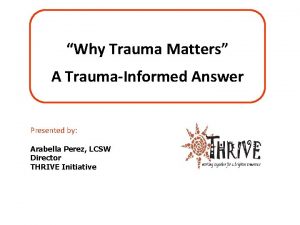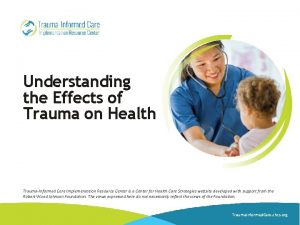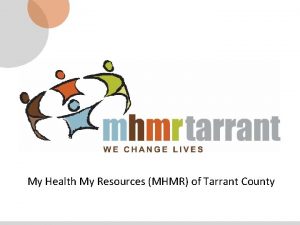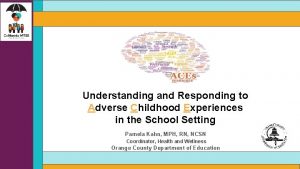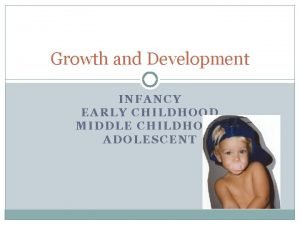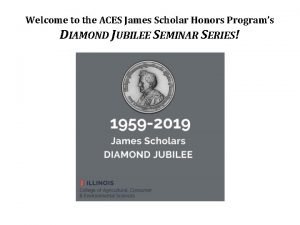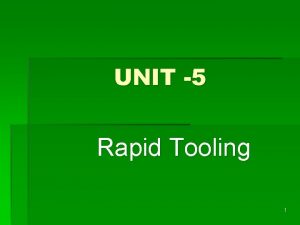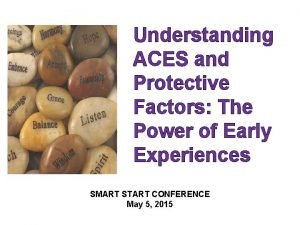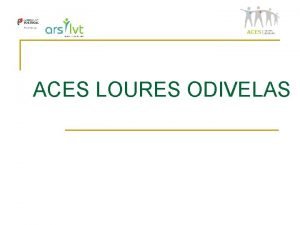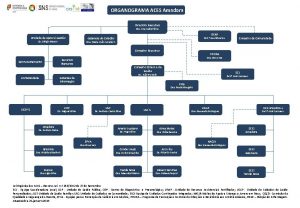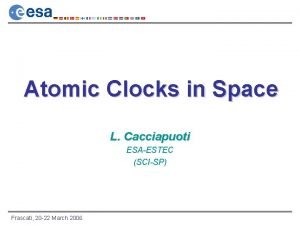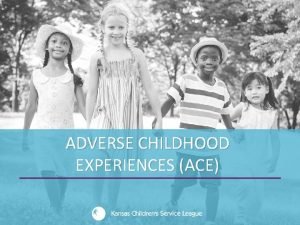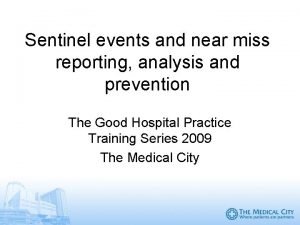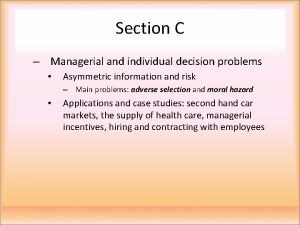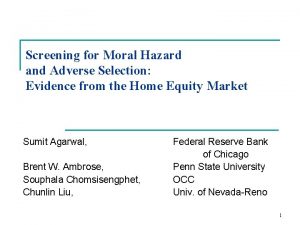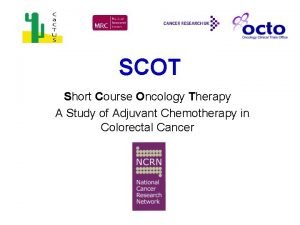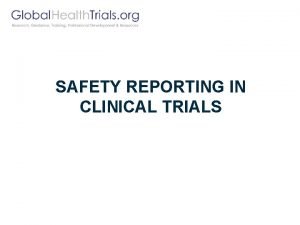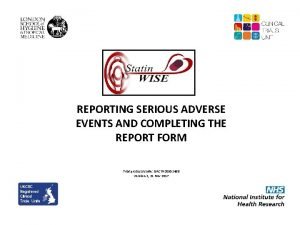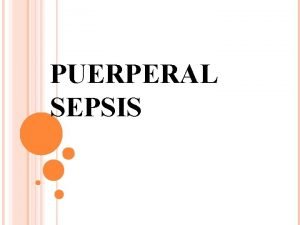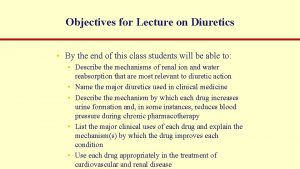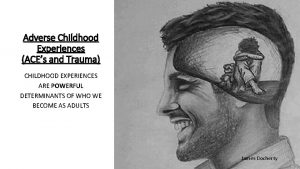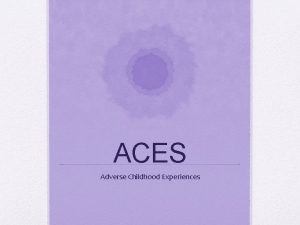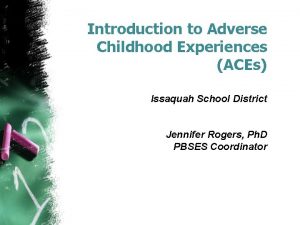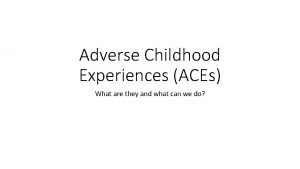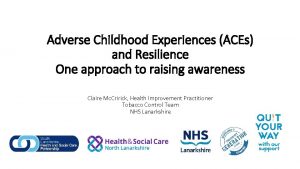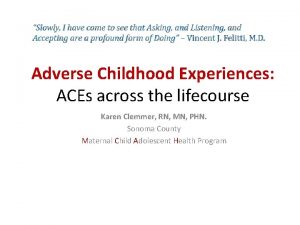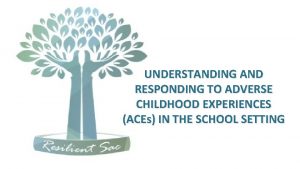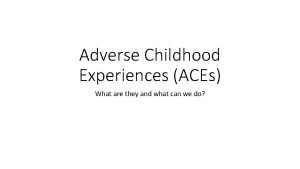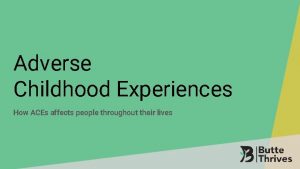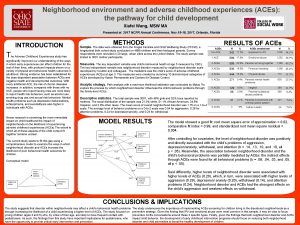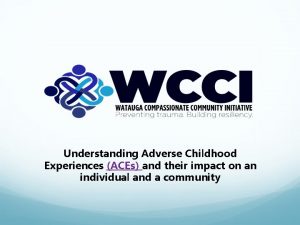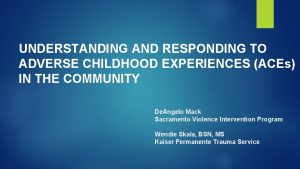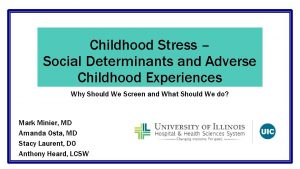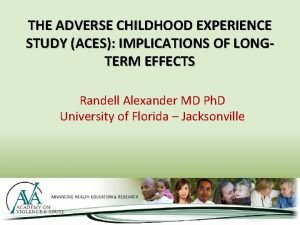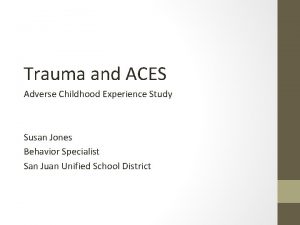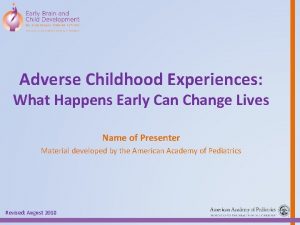Welcome Adverse Childhood Experiences ACEs what can we


































- Slides: 34

Welcome Adverse Childhood Experiences (ACEs) – what can we do?

Sara Dodds Adviser on Adverse Childhood Experiences Scottish Government Sara. dodds@gov. scot Katy Hetherington Child & Adolescent Health Lead NHS Health Scotland Katy. hetherington@nhs. net ADVERSE CHILDHOOD EXPERIENCES

Programme for Government September 2017 “What happens to us as children can have a huge impact on us throughout our lives. . . We will embed a focus on preventing ACEs and supporting the resilience of children and adults in overcoming early life adversity across all areas of public service, including education, health, justice and social work. ” http: //www. gov. scot/Resource/00524214. pdf

Resilience Documentary Screenings

Five minute film about the ACEs study: https: //vimeo. com/139998006

ADVERSE CHILDHOOD EXPERIENCES (ACEs) ABUSE NEGLECT HOUSEHOLD DIFFICULTIES

http: //www. healthscotland. scot/media/1267/2_mark-bellis-presentation. pdf

THREE CORE CONCEPTS IN EARLY DEVELOPMENT Experiences Build Brain Architecture ‘Serve & Return’ Shapes Brain Circuitry http: //developingchild. harvard. edu/ Toxic Stress Derails Healthy Development

Three Types of Stress Response

Scottish Government ACEs Policy Network Practitioner Network Communications & Engagement Group

Purpose: 1. Increase understanding of ACEs in Scotland 2. Develop actions to better prevent ACEs, and support the resilience of children and adults affected to mitigate the negative impacts of ACEs http: //www. healthscotland. scot/population-groups/children/adverse-childhood-experiences

Scottish Public Health Network Report May 2016 “The evidence of impact of adverse childhood experiences is compelling, as is the case for action from a moral and financial perspective at an individual level and to prevent the repeated cycle of intergenerational transmission. ” https: //www. scotphn. net/projects/adverse-childhoodexperiences/introduction/

Source: Scottish Government (2017) 2015/16 Poverty and Income Inequality in Scotland: 2015/16

Paper on ACEs and Attainment June 2017 “Schools are in a fantastic position to help support children and mitigate some of the effects that ACEs may have by recognising the factors which might affect children, building trusting relationships with them…and responding in a psychologically informed manner. ” http: //www. healthscotland. scot/publications/tackling-the-attainment-gap-by-preventing-and-responding-to-adversechildhood-experiences

“What’s wrong with you? ” “What happened to you? ” Blame Shame Punishment Understanding Nurturing Healing


Thank you

June Mc. Gill Partnership, Improvement and Data Officer Midlothian Council Early Learning and Childcare Team Impact on parents with 4 or more ACE’s though the Big Bedtime Read

Where: Woodburn Family Learning Centre • Woodburn is an area of high deprivation – top 15% • I delivered ‘Big Bedtime Read’ to a group of 20 individual parents over a 2 year period. Between them they had 44 children, age ranging from 0 to 15 • Big Bedtime Read - a great way to get parents understanding the importance of their role in their child’s early learning, improving sleep routines, bonding and attachment, developing mathematical, scientific and literate brain functions (research) • Conversation a lot bigger than just BBR! • • • Child development Managing behaviours Empathic listening Importance of singing, rhymes and stories Play Sleep Relationships Attachment Bonding Childhood and impact on parenting style Mental health and coping

Why? As I got to know the parents – evident that there were long standing difficulties with relationships, parenting, self esteem & poor mental health in some. I wondered if they could use the model to improve their parenting, resilience and sustainability - started a new ‘group’ Aim: Parents will show improved understanding with regard to their role in their children's learning by March 17 (17 weeks)

Measures: I asked myself ‘if I do this what do I expect to see, feel and hear’ – I measured that! Very subjective tho! I expected to see improvements in… • Behaviours – less confrontational, aggressive, dismissive • Attitudes – parents role as important, ‘good enough’ • Questions – those they asked me to be more relevant to their child and their learning • Involvement in the group – less time on phone, less time chatting about other things • understanding of their child’s developmental needs, their role in this and the ideas they had

Measures continues: 1 No sign of understanding or interest in their child's development; no engagement in the group discussions; chatting throughout the session; on phone the whole session not related to the discussion; using negative language about their child; talking about their childhood experiences but no understanding of the impact on their own parenting style; showing no sign of the impact of their parenting/behaviour on their child 2 Some indication of understanding of age and stage of child's development; showing signs of reasonable expectations; some understanding of their role in their child's learning; some understanding of the importance of learning through play and what their role in supporting this is; interested in engaging with the group but sporadic; 3 High levels of engagement in the group; lots of ideas shared; lots of support offered to others; understanding of their childhood experiences on their own parenting style; very involved in their child's learning though reading, playing, going out and about; using language that expresses their feelings without dismissing them; willing to support their child's learning and interested in tools/courses they can use

The group • 11 mum’s joined my more in-depth group looking at difficulties parenting. • All with 4 or more ACE’s. • 4 fully engaged over 17 weeks • Between the 4, 16 children. • All with SW & FS involvement or referred by HV • Some ‘A good time to be 2’ children • Stayed in paernts room unless they asked for a 1: 1

Theory of change – 4 core pillars • By talking conversationally with parents about all elements of child development and learning I will be able to improve their: • understanding of child development, age and stage • capacity to managing child’s ‘difficult’ behaviour • resilience and ability to better manage own emotions • interest in becoming their child’s most important keyperson

Recording • They updated their impact wheels and completed their PDSA’s • I made a point of having a direct chat with each one of them each time I saw them. • I used little 5 bar gates and notes but also my memory and gut feeling • I made note of the discussions we’d had each week relating to child dev, sleep, experiences etc

Testing – mum’s Each engaging parent had their own area of improvement they wanted to make. Measured this on an ‘impact wheel’. • Mum 1 – Leopard • Impact wheel identified what areas for a PDSA


Leopard - Bedtime Routine Reminders: Ø Small changes Ø Act on ideas Ø Don’t give up - You can do it! PDSA 5: Day 5 Task: turned phone off, had the conversation about no TV (no tantrum – yet) Plan – Start routine at 5. try no TV, bedtime routine activity, bed by 7 pm, read a book with funny voices. Do – felt a right eejit but did voices and he loved them…had to read the book 3 times! Only started at 6 because mum called. Turned phone off after that. Was happy to go to sleep without TV. Was really loving. Really enjoyed it. Study/Act – tell everyone I’m starting this at 5. remind myself to turn phone off somehow! I’m quite emotional at how easy it’s been and how lovely and calm I feel. PDSA 4: Day 4 Task – sent texts to everyone Plan – Use routine tool again. Bed for 7. Read 1 page of book. Do – used routine tool – went really well. Phone rang and rang! Managed to keep him on task tho. Read a whole book! He wasn’t that interested, looking for something, he eventually snuggled down but wanted the TV on. Gave in to it for tonight. Got to bed at 7. 30. Study/Act – prepare him for no TV. Put more effort into the reading! Turn phone off! Things take longer than I expected so start at 5. PDSA 3: Day 3 Do - Mum popped in and messed up my plan for today – really annoyed. Bed at 11. 30 pm. Nightmare. Study/Act - Tell everyone what I’m doing and to not come round after 5 till further notice. PDSA 2: Day 2 Task - made a routine chart. Plan – Use the new routine thingy. Try again for 7 pm. Hold the book! Do - Tried the routine, nightmare! Managed to read and get him to bed for 8 tho! whoop PDSA 1: Day 1 Plan - Bedtime as per usual – try for 7 pm, read a book Do - Spoke to A about importance of good sleep to learning, managed to get to bed at 9. 30 (usually 11 pm), never got to read book as too stressed. Study/Act - Tomorrow I’m going to try making a bedtime routine with him


Learning • Not for the feint hearted – very resource intensive and lots of responsibility – ones you’re in your can’t just walk away • Using the model definitely focused the mum’s minds but I had to keep it simple! • Using the impact wheel helped them visualise their own journey and realise all the impact they had • Started with my own example when teaching them about Mf. I – very simply • Needed a lot of support during the PDSA with what to try next • Things with a clear process – like a bedtime routine that they were in control of - worked better. When others got involved it got more difficult for them

Progress • 19 parents (1 dad) – all showing huge impact on their parenting and understand of their child’s learning and their role in this • Project ran for 2 years – 18 months before my relationship with the mum’s allowed me to take it to this level – lots of trust issues – resource intensive – 1 whole day per week in centre. Recorded what I saw/heard/felt through chatting in group. Used my gut…a lot! • Now stopped going to the centre but mum’s still very attached to me • Every single parent in the group (11 of the 19) showed signs of improvement in all their chosen areas – some have gone on to make further improvement • I may do a follow up.

Spread and Scale What next? • I’ve started at another centre so at the relationship building stage. Will I continue? • Not taking the same approach here as I don't have the same dedicated time to offer • Less deprived area however still issues with mental health and parenting evident

Question for table discussion How can we work together to address ACES in Scotland?

Thank you and close
 Adverse childhood experiences study
Adverse childhood experiences study Adverse childhood experiences study
Adverse childhood experiences study Mhmr of tarrant county
Mhmr of tarrant county Adverse childhood experiences study
Adverse childhood experiences study Slidetodoc.com
Slidetodoc.com Middle childhood is from
Middle childhood is from James scholar honors program
James scholar honors program Ace writing examples
Ace writing examples To be recognized as an “ace of aces” a cadet must
To be recognized as an “ace of aces” a cadet must Explanation sentence starters
Explanation sentence starters Soft tooling supplier
Soft tooling supplier Aces protective factors
Aces protective factors How to write an aces paragraph
How to write an aces paragraph Ace reading strategy
Ace reading strategy Usf moscavide
Usf moscavide Aces amadora
Aces amadora Aces check cashing
Aces check cashing Aces
Aces Aces
Aces Schoolsworkpro
Schoolsworkpro Mycil.org illinois
Mycil.org illinois Aces study abroad
Aces study abroad Wise men three clever are we
Wise men three clever are we Adverse reaction definition
Adverse reaction definition Near misses events
Near misses events Adverse selection
Adverse selection Adverse selection
Adverse selection Adverse reaction definition
Adverse reaction definition Adverse reaction definition
Adverse reaction definition Adverse events in hospital
Adverse events in hospital Ir adverse event
Ir adverse event Puerperal endometritis
Puerperal endometritis Adverse selektion
Adverse selektion Effects of paracetamol
Effects of paracetamol Loop diuretics adverse effects
Loop diuretics adverse effects
